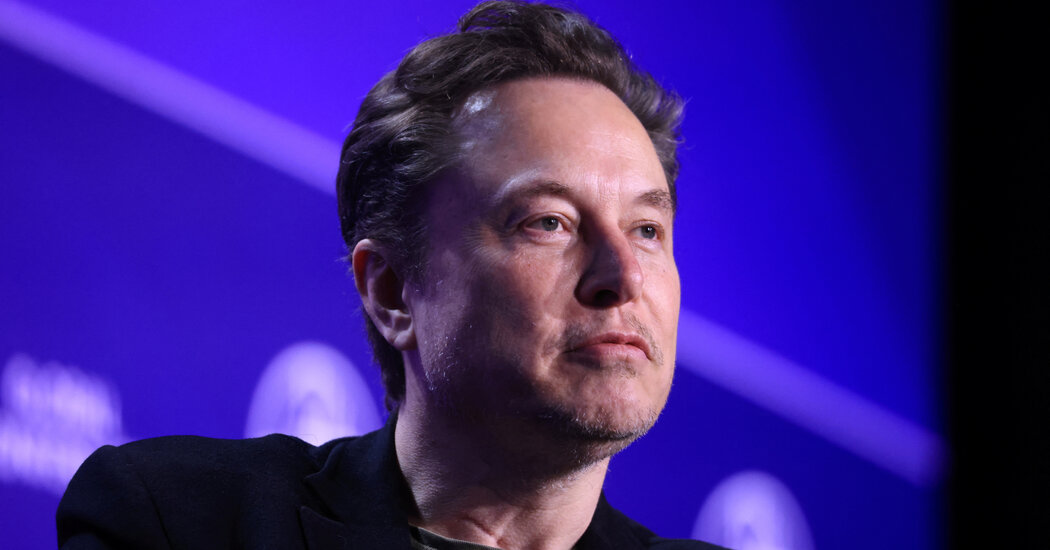Tesla shareholders have reaffirmed a pay award of more than $45 billion for Elon Musk, the chief executive, after it was thrown out in a legal challenge.
The vote result, announced at Tesla’s annual meeting at its headquarters in Austin, Texas, on Thursday, is a strong sign that shareholders still believe in Mr. Musk, and it could persuade the judge who voided the award to reinstate it.
Support for the pay award, made up of stock options, will come as a relief to Mr. Musk’s admirers, who feared that rejection would prompt him to spend less time managing Tesla or even quit. The vote was a setback for investors who had hoped it would send a message about the accountability of chief executives and the limits of executive pay.
The outcome may also help Mr. Musk qualify as the world’s richest person, worth well over $200 billion.
Addressing shareholders after the vote, he promised that he was committed to Tesla. The pay package, he said, “is not actually cash, and I can’t cut and run, nor would I want to.”
Tesla shares rose on Thursday ahead of the official announcement of the results after Mr. Musk said on X that the pay plan was passing by a wide margin.
Tesla’s board had called for the vote in response to a ruling by Chancellor Kathaleen St. J. McCormick of the Court of Chancery in Delaware, where Tesla is registered as a corporation. In January, Chancellor McCormick agreed with a group of disenchanted Tesla shareholders who contended in a lawsuit that the 2018 pay package was wildly excessive.
The board hoped that shareholder approval a second time might help address Chancellor McCormick’s finding that a 2018 vote in favor of the pay package was tainted because members of the board failed to disclose conflicts of interest stemming from their personal and financial ties to Mr. Musk.
“The legal battle over the compensation plan is far from over, but we think the vote greatly strengthens Tesla’s case,” Garrett Nelson, a stock analyst with CFRA Research, said in a research note on Thursday.
But some legal experts questioned whether a yes vote would cause Chancellor McCormick to revise her ruling, and Tesla has acknowledged that the vote would not necessarily resolve the case.
With the 2018 pay award, Mr. Musk owns 20.5 percent of Tesla, and just under 13 percent without.
Shareholders also approved a proposal to move Tesla’s corporate registration to Texas, a reaction to what Mr. Musk and the board perceived as unfair treatment by Delaware courts. The move will have no effect on the Delaware case.
They rejected a measure proposed by shareholders that called for Tesla not to interfere with workers trying to organize a union, and to bargain in good faith if they do. Mr. Musk has often expressed hostility toward organized labor. In Sweden, Tesla has refused to negotiate with mechanics who work for the company and have been on strike for nearly six months.
The compensation vote pitted those who regard Mr. Musk as a genius who has revolutionized the auto industry against those antagonized by his polarizing statements on X and recent slumps in Tesla sales and earnings.
Robyn Denholm, the chair of the Tesla board, argued that investors became wealthy because of Mr. Musk’s leadership, and that the company was obligated to give him what he had been promised.
“Elon is not only a visionary, but a C.E.O. with a proven ability to execute our mission and achieve incredibly ambitious business results that have generated extraordinary value for you,” she said in a letter to shareholders ahead of the vote.
But other shareholders have been dismayed by recent declines in Tesla sales and profit and by Mr. Musk’s polarizing statements on X, where he has endorsed some right-wing conspiracy theories and offended significant numbers of buyers.
Several large institutional investors voted against the pay package, including Norges Bank Investment Management, which manages Norway’s oil wealth and is the largest sovereign wealth fund. Also opposed was California Public Employees’ Retirement System, or CalPERS, the largest pension fund in the United States.
Tesla’s shares are down more than 25 percent this year, even as the broader stock market is up 14 percent. At its peak share price in 2021, the stock market value of Tesla was $1.2 trillion, putting it in the company of tech giants like Microsoft, Apple and Google. Its worth has since plunged to around $580 billion.
The package gave Mr. Musk stock options worth tens of billions of dollars if he hit demanding revenue or profit benchmarks and increased the company’s stock value to $650 billion.
Most of these targets were thought to be out of reach when the plan was approved in 2018. Tesla was struggling to produce its first moderately priced car, the Model 3 sedan. Soon after, though, Tesla’s business took off, and under the plan, the market value remained above the $650 billion target long enough for Mr. Musk to collect the options.
To survive legal challenges, the measure on pay required approval from a majority of voting shares in Tesla not including those held by Mr. Musk or his brother, Kimbal Musk.
#Tesla #Shareholders #Approve #C.E.O #Elon #Musks #Pay #Package,
#Tesla #Shareholders #Approve #C.E.O #Elon #Musks #Pay #Package
